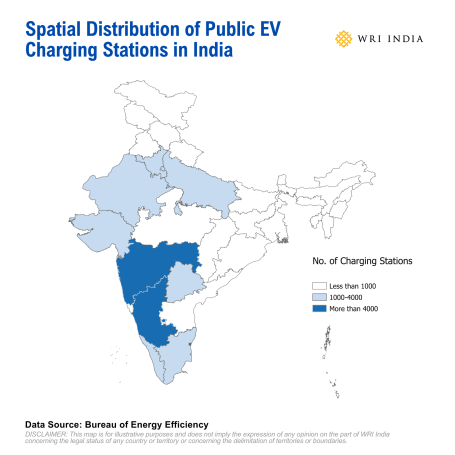Powering the EV Shift: Building India’s Charging Ecosystem
A safe, reliable, accessible, and affordable charging network is vital to accelerating India’s transition to electric mobility. It reduces range anxiety, builds public confidence, and opens doors for entrepreneurs and startups to enter a growing clean mobility ecosystem.
India has committed to achieving 30% electric vehicle (EV) sales by 2030. However, as of November 2024, there were 34,629 public charging stations supporting 5.4 million EVs — roughly one for every 156 vehicles. While private and semi-public charging solutions are deployed in homes, apartments, or commercial premises, public charging infrastructure requires strategic city-wide planning, adequate land availability, and thoughtful integration into urban mobility systems.

Accelerating Charging Infrastructure Through Policy, Planning, and Partnerships
WRI India works closely with national, state, and city authorities to address infrastructure gaps through data-driven planning, policy design, and implementation support. Our initiatives include:
- Conducting spatial analysis to inform charging station deployment.
- Supporting cities like Mumbai, Surat, and Lucknow in crafting comprehensive EV policies with roadmap for EV charging infrastructure deployment and targets.
- Integrating charging infrastructure into building byelaws.
Evaluating the Financial Viability of Charging Stations
Establishing public charging stations (PCS) involves significant financial planning. Key questions include:
- What are the financials involved in setting up a PCS?
- How can the viability of a PCS project of any size or configuration be objectively evaluated?
- What are the major input variables that impact net revenue and how do revenue trends evolve?
- What makes a PCS project investment-worthy?
These are just some of the critical questions addressed by WRI India’s Financial Analysis of Charging Station Tool (FACtTool). It is a unique, Excel-based application designed to analyze the financial performance of PCS investments. It is the first publicly available, open-access solution tailored for India’s electric mobility ecosystem. Supported by a comprehensive Technical Note, the tool outlines methodology, parameters, and step-by-step guidance for users to evaluate charging infrastructure investments with transparency and precision.
Supporting State-Led Charging Expansion in Key States
WRI India works closely with state governments across the country to accelerate the deployment of public and private EV charging infrastructure. From developing residential, workplace, and retail charging guidelines in Delhi, to supporting policy implementation in Bihar, and strengthening market-led approaches in Gujarat, WRI India’s efforts are tailored to local contexts and aligned with broader decarbonisation goals. Across these engagements, we provide technical expertise, support institutional capacity, and enable data-driven decision-making to scale accessible and reliable charging infrastructure.
For instance, WRI India is supporting the Uttar Pradesh Renewable and EV Infrastructure Limited (UPREV) in developing an implementation strategy to expand the state’s EV charging network under the Uttar Pradesh Electric Vehicle Manufacturing and Mobility Policy 2022. This includes:
- Integrating renewable energy solutions
- Maintaining grid stability amid growing EV demand
- Providing technical support for operationalising UPREV
Aligning Local Action with National Goals
By combining spatial tools, financial analysis, urban planning expertise, and policy innovation, WRI India supports the creation of charging ecosystems that are scalable, equitable, and investment ready. Our work helps align local implementation with India’s national ambition of a low-emission transport system, ensuring that the electric mobility revolution is not just fast, but also fair and future-ready.

